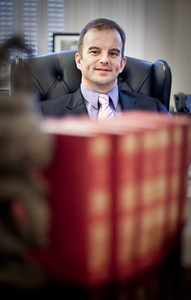Trueman on the Janet Mefferd Show
August 15, 2011

Rev. Dr. Carl Trueman, professor of historical theology and church history, discusses his book Reformation: Yesterday, Today, and Tomorrow. The show aired Friday, July 22, 2011, on the Janet Mefferd show.
Click here to listen to Dr. Trueman's talk with Janet Mefferd
To what degree have evangelicals been discovering the Protestant Reformation in recent years?
I think there's a tremendous excitement out there. Particularly, amazingly enough, among the younger generation of Christians that I come across. Many of them are involved in this 'young, restless, and reformed' movement, individuals and churches that have become tired of 'Christianity lite,' if you like, and a rather pragmatic message coming from the pulpit. They've gone back and found real meat for their souls in the writings and the ideas and some of the themes that the Reformers and their successors, the puritans, were exploring in the 16th and 17th century. So I'm greatly encouraged on that score.
Why are people gravitating towards the time period of Church history of the Reformation, when there are many other time periods to look to?
You're absolutely correct. There have been many great insights throughout Church history, so one wouldn't want to say that the Reformation was the only time that anything worth looking at was happening. But what I think the Reformers did particularly well was look at, for lack of a better word, the great existential questions of the Christian life: "How do I get right with God? How do I stand righteous, even though I'm a sinner, before God? Where do I look to for authority?" These are the sorts of questions that were foremost in the Reformers' minds, and I think that in the kind of age we live in now, these are again coming to the fore.
What was it like in this era, in 1517 when Martin Luther nailed his 95 theses on the door in Wittenberg? What was the Roman Catholic Church like at that time?
It's difficult to generalize because clearly Europe (although now it is fairly small because we can travel fast from place to place) in the 16th century was very vast and quite diverse. If you're in the south of Spain where there was significant Islamic population, the church was very militant, knew very clearly what it believed. The further North you went, I think the more relaxed it was about doctrine, and, certainly as an institution, there was tremendous corruption that had set in. The Reformers and many people who remained in the church, even after the Reformation all agreed that the administrative structure of the Church needed to be reformed because of the vast moral corruption that had set in. So, the Church was in a bad condition at that time; it was crying out for both administrative reform as well as theological reform.
 Click here to listen to Dr. Trueman's talk with Janet Mefferd
Click here to listen to Dr. Trueman's talk with Janet Mefferd
Order your copy of Reformation: Yesterday, Today, and Tomorrow at the Westminster Bookstore.








